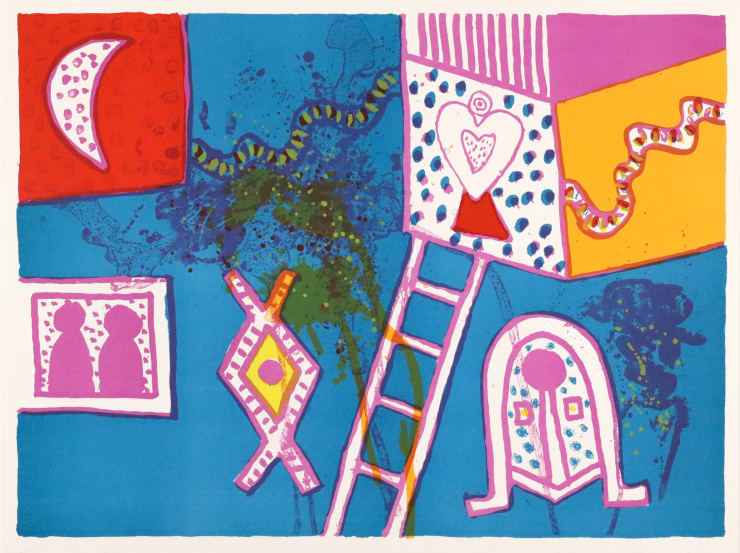Alan Davie
Alan Davie (1920–2014) was a Scottish painter, printmaker, and musician celebrated for his bold, improvisational approach to art. Born in Grangemouth, he studied at Edinburgh College of Art before serving in the Royal Artillery during World War II.
After the war, he pursued jazz music and jewellery-making, both of which informed his creative practice. In the late 1940s, Davie travelled across Europe, where he encountered the works of Paul Klee and Jackson Pollock. A pivotal moment came in 1948 when Peggy Guggenheim purchased his work in Venice, boosting his international profile.
Davie's paintings are known for their energetic symbols, layered textures, and spiritual undertones. Influenced by Zen Buddhism, Surrealism, and ancient cultures, he embraced spontaneity and the subconscious in his art. Often working on the floor, he built up compositions through gestural marks and recurring motifs, creating a personal visual language that bridged abstraction and symbolism.
Throughout his career, Davie exhibited widely, including solo shows at Gimpel Fils in London and participation in major events like the Venice Biennale and documenta. His works are held in prominent collections such as the Tate, the Museum of Modern Art in New York, and the Peggy Guggenheim Collection.
In recognition of his contributions to art, he was appointed a Commander of the Order of the British Empire (CBE) in 1972.
-
 Alan DavieGrangemouth Image, 2010£1,850.00
Alan DavieGrangemouth Image, 2010£1,850.00 -
 Alan DavieVariations on a Theme - 15, 2003Framed£275.00
Alan DavieVariations on a Theme - 15, 2003Framed£275.00 -
 Alan DavieVariations on a Theme - 34, 2003Framed£275.00
Alan DavieVariations on a Theme - 34, 2003Framed£275.00 -
 Alan DavieCosmic Signals No.2, 2001£1,500.00
Alan DavieCosmic Signals No.2, 2001£1,500.00 -
 Alan DavieTo a Celtic Spirit II, 2001£1,950.00
Alan DavieTo a Celtic Spirit II, 2001£1,950.00 -
 Alan DavieBlue Incantation, 1999FramedSold
Alan DavieBlue Incantation, 1999FramedSold -
 Alan DavieIncantation, 1999Framed£1,035.00
Alan DavieIncantation, 1999Framed£1,035.00 -
 Alan DavieFoxwatch XVI, 1970Framed£1,200.00
Alan DavieFoxwatch XVI, 1970Framed£1,200.00








